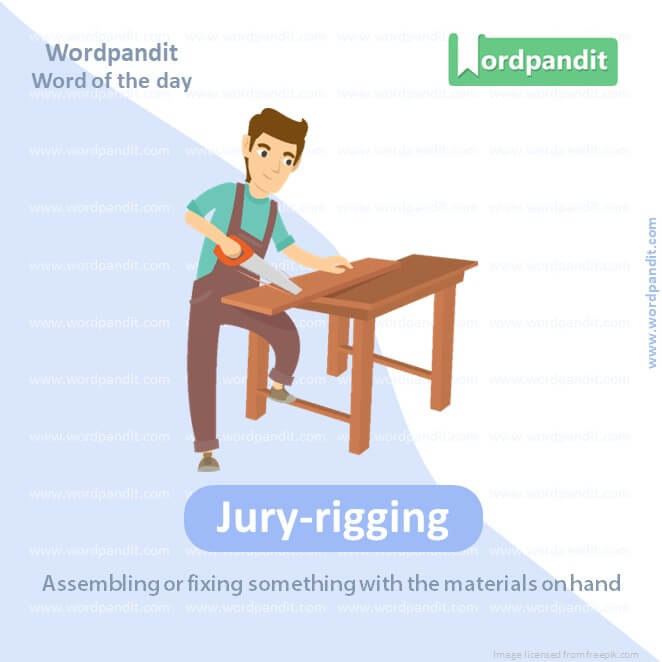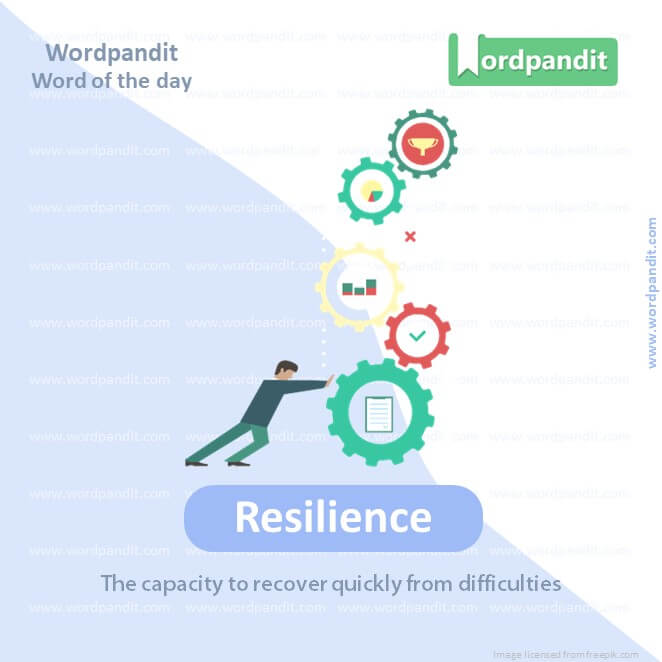Daily Vocabulary Words: List of Daily Used Words in Leading Indian Newspapers
Hi there. Welcome to this special section @ Wordpandit. Our endeavour here is straightforward: highlighting daily vocabulary words that you would come across in leading newspapers in the country. We have included the following newspapers in our selection:
• The Times of India
• The Economic Times
• Hindustan Times
• Mint
• Indian Express
We are putting in extensive work to develop your vocabulary. All you have to do is be regular with this section and check out this post daily. This is your repository of commonly used words; essentially, we are posting a list of daily used words. Hence, this has significant practical application as it teaches you words that are commonly used in leading publications mentioned above.
Visit the website daily to learn words from leading Indian newspapers.

WORD-1: Jury-rigging
CONTEXT: The local farmers in the flood-affected regions have resorted to jury-rigging temporary housing structures to provide a place to live for their livestock until the barns can be repaired.
SOURCE: The Times of India
EXPLANATORY PARAGRAPH: Imagine if your toy broke and you didn’t have the right tools to fix it. So, instead, you use tape or glue or something else you find just to make it work again. That’s like “jury-rigging.” It’s when you quickly fix something using whatever you have around, even if it’s not the perfect solution.
MEANING: Assembling or fixing something with the materials on hand (verb).
PRONUNCIATION: joo-ree-rig-ing
SYNONYMS: makeshift, improvised, throw-together, patch-up, temporary fix, slapdash, MacGyvered
USAGE EXAMPLES:
1. The sailors were jury-rigging the sail after it tore in the storm.
2. I jury-rigged my broken phone charger with some tape.
3. The kids jury-rigged a ramp for their skateboard using old planks.
4. The campers had to jury-rig a shelter when their tent broke.

WORD-2: Resilience
CONTEXT: The resilience of the Indian economy appears in its ability to recover from the devastating effects of the global pandemic. Despite the initial slump, growth projections are cautiously optimistic.
SOURCE: The Economic Times
EXPLANATORY PARAGRAPH: Think of a rubber band. Even if you stretch it, it goes back to its shape when you let go. That’s how “resilience” is. It’s the ability to bounce back after something tough or challenging happens.
MEANING: The capacity to recover quickly from difficulties (noun).
PRONUNCIATION: reh-zil-yens
SYNONYMS: toughness, flexibility, strength, adaptability, robustness, hardiness, elasticity
USAGE EXAMPLES:
1. The plant showed resilience by growing in the dry desert.
2. Lisa’s resilience helped her cope with any challenge.
3. The city’s resilience after the storm was commendable.
4. Learning from mistakes builds resilience in children.

WORD-3: Surmise
CONTEXT: Analysts surmise that the recent surge in the stock market may be attributed to information leaks about the upcoming budget announcements.
SOURCE: Hindustan Times
EXPLANATORY PARAGRAPH: If you see someone with an umbrella and wet shoes, you might think it’s raining outside, even if you didn’t see the rain. That’s “surmise”. It’s when you guess something based on what you see or feel without being completely sure.
MEANING: Suppose that something is true without evidence to confirm it (verb).
PRONUNCIATION: sur-mize
SYNONYMS: guess, presume, speculate, assume, infer, conjecture, deduce
USAGE EXAMPLES:
1. From her smile, he surmised she was happy.
2. The detective surmised that the thief entered from the window.
3. She surmised that it might rain because of the dark clouds.
4. Based on the loud noise, they surmised the concert had started.

WORD-4: Tenacity
CONTEXT: The tenacity shown by frontline workers during the pandemic reflects the spirit of India’s healthcare system. Their incessant dedication has kept the wheel turning against all adversities.
SOURCE: Mint
EXPLANATORY PARAGRAPH: Imagine a dog with a toy. Even if you try to take it, the dog holds on tight and doesn’t let go. That’s “tenacity”. It’s when you hold onto something or keep trying, no matter how hard it is.
MEANING: The quality of being very determined; determination (noun).
PRONUNCIATION: teh-nass-ih-tee
SYNONYMS: determination, perseverance, persistence, resolve, grit, doggedness, steadfastness
USAGE EXAMPLES:
1. Her tenacity helped her finish the long race.
2. The tenacity of the team led them to victory.
3. He admired her tenacity in pursuing her dreams.
4. Despite many failures, his tenacity was commendable.

WORD-5: Ubiquitous
CONTEXT: With its ubiquitous presence, social media has not only become an integral part of our personal lives but has also significantly affected advertising and politics at a macro level.
SOURCE: Indian Express
EXPLANATORY PARAGRAPH: Imagine seeing teddy bears everywhere you go – in the park, at school, in stores. When something is everywhere, we call it “ubiquitous”.
MEANING: Present, appearing, or found everywhere (adjective).
PRONUNCIATION: yoo-bi-kwuh-tus
SYNONYMS: omnipresent, pervasive, widespread, everywhere, all-over, prevalent, universal
USAGE EXAMPLES:
1. Mobile phones are ubiquitous nowadays.
2. Trees are ubiquitous in the forest.
3. Fast-food chains have become ubiquitous in cities.
4. The song was so popular it seemed ubiquitous on the radio.
WORD-6: Genocide
CONTEXT: The genocide that took place in Rwanda in the 1990s is a dark chapter in human history and serves as a grim reminder of the depths of horror that hate and prejudice can lead to.
SOURCE: The Times of India
EXPLANATORY PARAGRAPH: Imagine a very mean person who doesn’t like a certain group of people and tries to harm or get rid of all of them. This very bad act of hurting or getting rid of a whole group of people is called “genocide”.
MEANING: The deliberate killing of a large group of people, especially of a particular nation or ethnic group (noun).
PRONUNCIATION: jen-oh-side
SYNONYMS: mass murder, extermination, annihilation, mass killing, holocaust, slaughter
USAGE EXAMPLES:
1. The history class discussed the genocide during the war.
2. It’s essential to remember past genocides to prevent them in the future.
3. International courts try to punish those responsible for genocides.
4. The documentary highlighted the horrors of genocide.
WORD-7: Engendered
CONTEXT: The government’s focus on renewable energy has engendered a new boom in the clean energy sector, attracting both domestic and foreign investments.
SOURCE: The Economic Times
EXPLANATORY PARAGRAPH: Imagine planting a seed in the ground. After some time, because of the seed, a plant grows. Similarly, when something causes or starts something else, it’s “engendered”.
MEANING: Cause or give rise to (verb).
PRONUNCIATION: en-jen-dered
SYNONYMS: cause, produce, generate, provoke, induce, stir up, create
USAGE EXAMPLES:
1. The speech engendered hope in the audience.
2. The movie’s plot twist engendered much discussion.
3. New technologies have engendered changes in daily life.
4. The incident engendered a need for stricter rules.
WORD-8: Cusp
CONTEXT: With the third phase of vaccination rolling out, India stands on the cusp of establishing a formidable shield against COVID-19.
SOURCE: Hindustan Times
EXPLANATORY PARAGRAPH: Imagine the pointy top of a triangle. That point or edge is like a “cusp”. It’s a point or a moment when something changes or is about to change.
MEANING: A pointed end where two curves meet, or the verge of a significant change (noun).
PRONUNCIATION: kusp
SYNONYMS: point, tip, edge, verge, brink, threshold, precipice
USAGE EXAMPLES:
1. She was on the cusp of a major discovery.
2. The tooth had a sharp cusp.
3. The city is on the cusp of a technological revolution.
4. Born on the cusp, he showed traits of both zodiac signs.
WORD-9: Incinerated
CONTEXT: Large chunks of Australia’s forest area were incinerated during the 2020 bush fires, resulting in a massive loss of wildlife habitat.
SOURCE: Mint
EXPLANATORY PARAGRAPH: When you burn something so completely that it turns into ash, you’ve “incinerated” it. It’s like when paper is burnt in a fire, and it disappears into tiny gray pieces.
MEANING: Burn something completely, turning it into ash (verb).
PRONUNCIATION: in-sin-uh-ray-ted
SYNONYMS: burn, cremate, consume, torch, blaze, scorch, combust
USAGE EXAMPLES:
1. The old documents were incinerated for security.
2. The waste plant incinerated the garbage.
3. The evidence was incinerated to prevent discovery.
4. After the wildfire, the entire forest was incinerated.
WORD-10: Inevitable
CONTEXT: As cyber threats become increasingly sophisticated, the adoption of cybersecurity measures is inevitable for businesses to safeguard their data and digital assets.
SOURCE: Indian Express
EXPLANATORY PARAGRAPH: Think about the sun setting every evening. No matter what, it’s going to happen. That’s “inevitable”. It means something is sure to happen and can’t be avoided.
MEANING: Certain to happen and unavoidable (adjective).
PRONUNCIATION: in-ev-ih-tuh-bul
SYNONYMS: unavoidable, certain, sure, bound to happen, fated, predestined, inescapable.
USAGE EXAMPLES:
1. Growing old is inevitable.
2. The team’s defeat was inevitable after their poor performance.
3. It’s inevitable that technology will continue to evolve.
4. After the mistakes, criticism was inevitable.
Vocabulary Sentence
The task of mastering language stretches beyond the realm of solitary words. It invites us to construct and comprehend a ‘vocabulary sentence’. This amalgamation of words into meaningful sentences adds layers to our linguistic prowess. However, effectively learning from a ‘vocabulary sentence’ requires some strategic insight. So, how should we approach it?
Firstly, when encountering a ‘vocabulary sentence’, it’s pivotal to comprehend the word in context. Deciphering its place and role in the sentence gives a deeper insight into the word’s meaning, usage, and nuances. This approach aids in firm retention and active application of words.
Another technique to master a ‘vocabulary sentence’ is to break it into manageable chunks. Look at each word, understand its function, and then put it all together to comprehend the sentence as a whole. This step-by-step dissection and understanding better cements the ‘vocabulary sentence’ into your learning.
Mimicking the prosody and rhythm of language while practicing ‘vocabulary sentence’ can also foster better learning. In this regard, listening to podcasts or watching videos in the target language can be exceptionally beneficial. They showcase real-life demonstrations of how words are strung together into sentences with correct stress patterns and intonations.
Lastly, crafting your own ‘vocabulary sentence’ with learnt words strengthens understanding and boosts recall. Be it during conversation or writing, actively using these sentences plays a key role in contextual learning.
In essence, unfolding a ‘vocabulary sentence’ is a treasure trove of learning opportunities. With proper understanding, breaking sentences into chunks, mimicking prosody, and actively crafting sentences, the journey of learning from a ‘vocabulary sentence’ becomes engaging and fruitful. Every sentence learnt and applied is a valuable catch in the linguistic sea!









